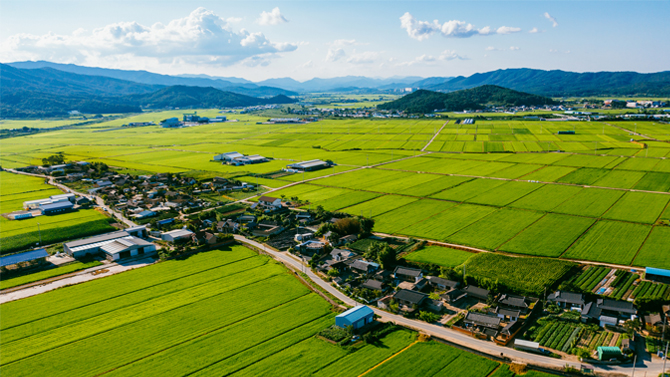Social Issues addressed by Sumitomo —Compass for the Future—
Industry-leading pioneering initiatives to address climate change and biodiversity conservation
Business helping resolve social issues by supporting disaster prevention and mitigation
 Planetary Health
Planetary Health Resilience
ResilienceClimate change is increasing the frequency and severity of natural disasters. Whereas typhoons at the higher end of the intensity scale used to batter the Japanese archipelago once in several decades, they occurred in rapid succession in 2018 and 2019, causing massive wind and flood damage, and insurance claims paid by the industry as a whole reached more than 1 trillion yen for two consecutive years. Mindful that responding to disasters is a crucially important theme for the non-life insurance industry, Mitsui Sumitomo Insurance (MSI) is engaged in initiatives on a broad front for the good of Earth and its inhabitants.
In 2021, MSI positioned climate change as a key issue to be addressed by the entire company, establishing a task force in the Corporate Planning Department. In promoting this initiative, MSI defined climate change symptoms as reflecting the disorder of Earth whose root cause is rampant exploitation of natural capital. Having concluded that MSI should also address the issue of biodiversity, which is a vital source of natural capital, in January 2022 MSI also began integrating the perspective of biodiversity in its initiatives.
In fact, MSI’s sustainability initiatives related to natural capital began several years earlier. In 2005, in collaboration with the Indonesian government, the company launched a tropical forest restoration project that continues to this day, involving the planting of trees, measures to revitalize the local economy, and environmental education for local communities.


Since 2007, MSI has held an annual symposium entitled “The Story of Biology Told by Companies,” which led to the establishment in 2008 of the Japan Business Initiative for Conservation and Sustainable Use of Biodiversity (currently, Japan Business Initiative for Biodiversity, JBIB for short). JBIB is a joint research forum focusing on biodiversity conservation and sustainable use of biological resources. MSI’s parent company MS&AD Insurance Group Holdings has been serving as the chair company of JBIB. A JBIB working group on biodiversity conservation in corporate green spaces developed a certification system for business sites’ biodiversity conservation efforts (ABINC certification by the Association for Business Innovation in harmony with Nature and Community). The site of MSI’s Head Office in Surugadai, Tokyo, has a greening ratio of more than 40%. Its green spaces, notable for native tree species that form an attractive habitat for birds, reflect a deep commitment to biodiversity.

The Taskforce on Nature-related Financial Disclosure (TNFD) was established in 2021, whose values and practical approach are inspired by the Task Force on Climate-related Financial Disclosure (TCFD). An employee of the MS&AD Insurance Group has been appointed as the sole Taskforce Member from Japan. MS&AD Insurance Group Holdings is the convenor of the TNFD Consultation Group of Japan.
MSI has been conducting diverse climate change mitigation and biodiversity conservation activities on a broad front as described above. It is noteworthy that MSI has been promoting these initiatives not only from the perspective of social contribution but also as the business of a non-life insurance company. Going beyond the conventional business model of paying insurance claims when disasters occur, MSI is offering new businesses and services to curb social losses caused by disasters.
From the perspective of planetary health or the relationship between Earth and its inhabitants, disaster prevention and mitigation are indispensable. MSI has launched a number of insurance products and services to support disaster prevention and mitigation. For example, Disaster Prevention Dashboard is for a disaster prevention and mitigation service for local governments jointly developed with MS&AD InterRisk Research & Consulting, a member of the MS&AD Insurance Group. By providing real-time weather data, flood risk for more than 30 hours ahead, and AI-based damage estimates after disaster strikes at a glance on a dashboard, this service supports local governments’ measures for disaster prevention and mitigation. In cooperation with UrbanX Technologies, Inc. MSI offers the Dashcam roadmanager service. Roads must be checked following high winds or flooding, but inspections may be inadequate owing to a lack of human resources at municipalities and road repair companies. Dashcam roadmanager collects road surface data from dashcams mounted on the vehicles of retailers, logistics companies, etc., analyzes the data, and automatically detects and maps damaged areas. This service enhances the efficiency of road inspections and facilitates repair of damaged areas, leading to enhanced road safety.


When disaster strikes, victims must obtain a certificate attesting to victim status from the local government in order to use administrative support programs, such as support grants for reconstructing livelihoods and tax exemptions. As the increasing frequency and severity of disasters imposes a heavy workload on local governments, delays in issuing these certificates have become a social issue. In response, MSI launched Support for Reconstructing Livelihoods of Flood Victims, the first service of its kind in the industry. To facilitate the prompt and efficient issuing of disaster victim certificates in the event of flooding, MSI provides local governments with actionable information based on the damage assessment it conducts.

MSI intends to continue leading the industry in matters related to climate change and biodiversity conservation, while also focusing on initiatives that lead to disaster prevention and mitigation from a business perspective.


Read about initiatives to achieve a low-carbon society, aiming at net-zero greenhouse gas emissions since these emissions are implicated in global warming.

In view of ongoing globalization and the growing complexity of supply chains, companies need to respond appropriately to issues in supply chains.

The pace of workstyle reform is accelerating as the COVID-19 pandemic has prompted numerous companies to embrace novel ways of working.

For companies, the COVID-19 pandemic has brought the crucial importance of employee health into sharp focus.

Accelerating global warming poses serious business risks. Accordingly, companies need to formulate strategies and implement specific countermeasures from a medium- to long-term perspective.

Spurred by efforts to reduce environmental impacts and in line with increasing social needs, replacement of gasoline-powered vehicles with electric vehicles is accelerating.

Vigorous initiatives are afoot to tackle social issues by revitalizing communities and the interpersonal relationships that bind them together.

Poverty persists in contemporary Japan and the existence of child poverty is a grave concern.

In view of the continuing decline of Japan’s working age population, due to population aging coupled with a low birthrate, development of the next generation is an urgent issue.

The rapid progress in medicine in recent years is largely due to the efforts of not only universities and other research institutions but also of companies to develop cutting-edge technologies.

Numerous initiatives to promote industry and commerce at the regional and community level are underway, involving the use of renewable energy and thus contributing to decarbonization.

One-third of food produced is lost or wasted globally, amounting to about 1.3 billion tons per year. Food loss and waste is a pressing issue in need of a solution.

Companies are addressing a wide range of issues so that people and companies can coexist in harmony with the global environment.

In addition to natural disasters, there are various types of hazards whose nature, incidence and severity are changing with the times. Resilience and flexibility are indispensable in dealing with them.

Read about initiatives to achieve sustainable regional revitalization. The attributes and resources that each region can offer are leveraged to strengthen local economies and overcome the problem of population decline.